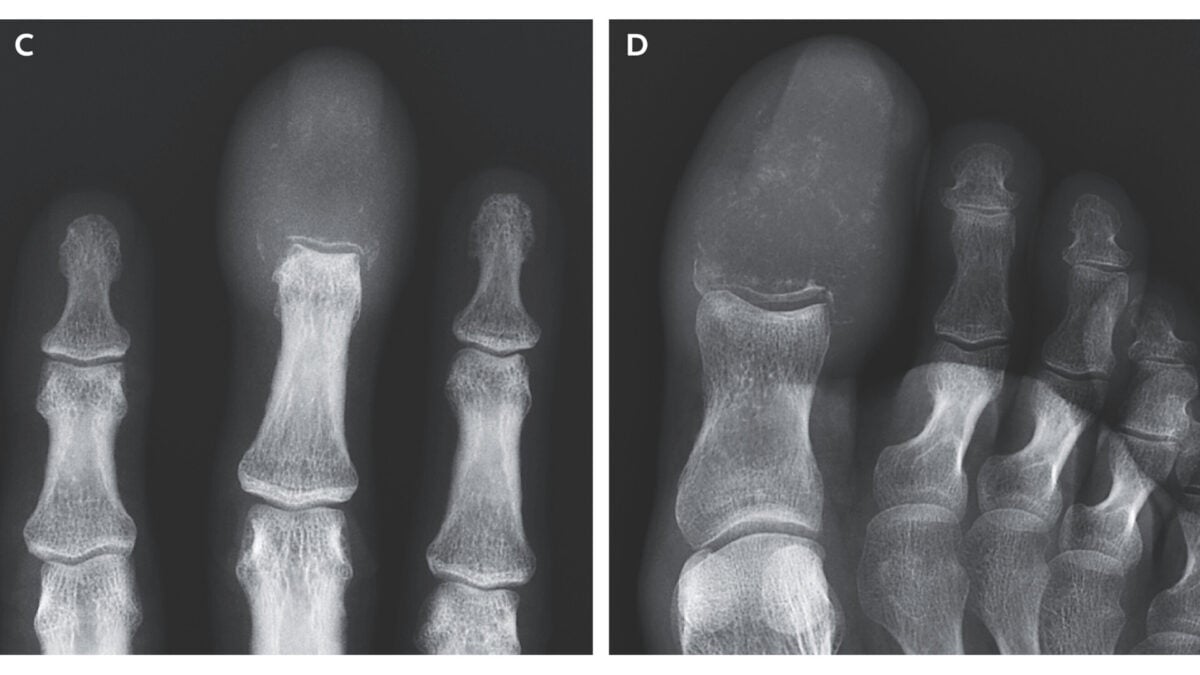Rare Bone-Eating Cancer Replaced Man's Finger and Toe

A 55-year-old man’s swollen toes and fingers turned out to have a much stranger explanation than expected. In a recent case report, the man’s doctors detailed how some of his bones were “completely replaced” by metastatic tumors.
Doctors in Australia described the case earlier this month in the New England Journal of Medicine. The man visited the hospital after weeks of having pain and swelling in one finger and one toe. They soon discovered the symptoms were an unusual complication of the man’s earlier diagnosed metastatic squamous-cell lung cancer. Tragically, he soon died after.
The man, as it turned out, had acrometastases—or cancers that had spread beyond his lungs to the bones past his elbows and knees. Acrometastases are incredibly rare, only estimated to occur in 0.1% of cases where cancer spreads to the bones. Though they’re sometimes the first sign of a hidden late-stage cancer, they’re more often preceded by other noticeable symptoms, as in this case. The condition is typically caused by cancers of the lung, gastrointestinal tract, and urinary tract; it’s also more common in men.
According to the report, the man had experienced six weeks of painful swelling in his right middle finger and right big toe, along with an open wound under the toe’s fingernail. The swollen appendages were also firm and tender to touch. Acrometastases can superficially resemble gout or osteomyelitis, the report authors noted. But X-rays easily revealed the cause behind the man’s symptoms: cancerous lesions that had “completely replaced” the outermost bones of his finger and toe.
Images of the man’s finger and toe can be seen here in an X post from the NEJM, and also embedded below.
55-year-old man with metastatic squamous-cell lung cancer presented with a 6-week history of pain and swelling of the right great toe and the tip of the right middle finger.
Read the full case details in the Images in Clinical Medicine article “Acrometastases,” from @petermaccc… pic.twitter.com/SPwSuKVZHV
— NEJM (@NEJM) July 17, 2025
Because acrometastases are usually the result of highly advanced cancer, people’s odds of survival once they develop it are already low. People are typically expected to live less than six months after diagnosis. In this case, the doctors opted to treat the patient with palliative radiotherapy, which is intended to alleviate the symptoms of cancer rather than to eradicate it. The man died about three weeks later from refractory hypercalcemia, or dangerously high levels of calcium in the blood that don’t respond to standard treatment. This condition is often a complication of cancer as well.



- CỘNG ĐỒNG
- News
- Tech
- Food
- Causes
- Personal
- Art
- Crafts
- Dance
- Drinks
- Film
- Fitness
- Παιχνίδια
- Gardening
- Health
- Κεντρική Σελίδα
- Literature
- Science
- Networking
- Party
- Religion
- Fashion
- Sports
- Αστέρια
- Xã Hội


